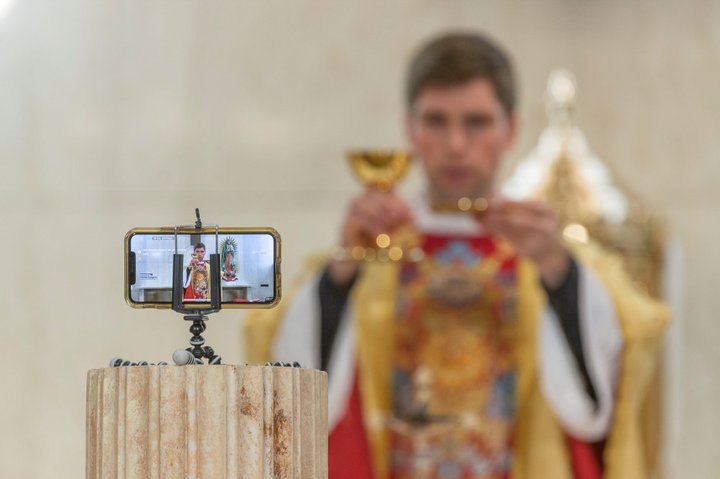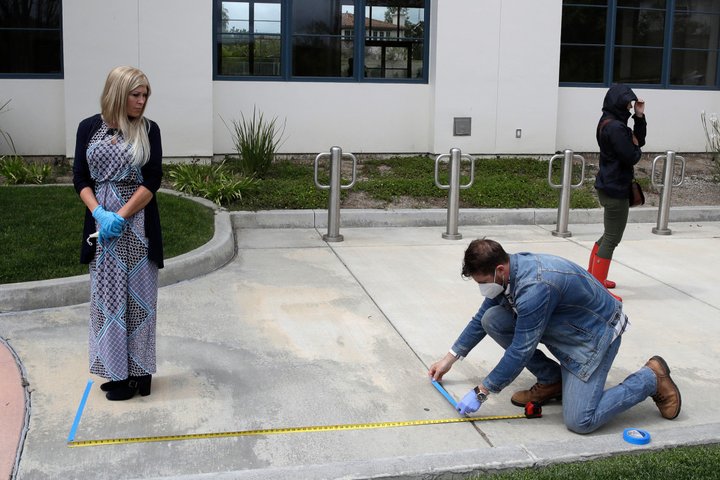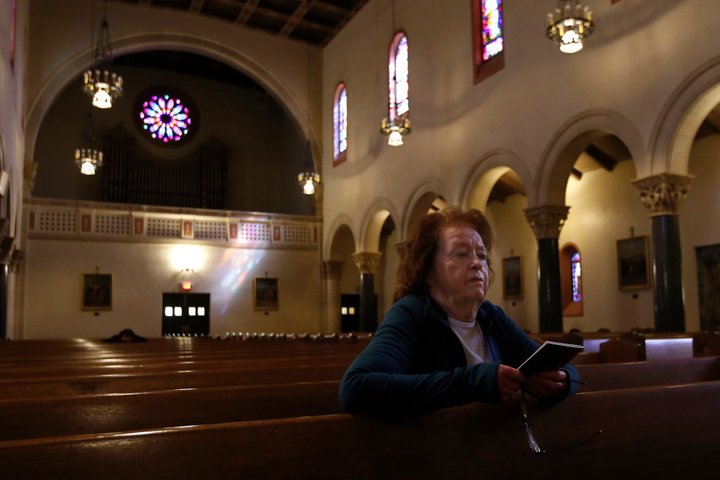
The Rev. Matthew Wheeler is seen on an iPhone screen live-streaming the celebration of the the Mass of the Lord’s Supper at St. Anthony Parish in San Gabriel, Calif., Thursday, April 9, 2020. With no public Mass due to the coronavirus pandemic, the church live-streams its services. Photo by AP Damian Dovarganes, AP Photo
###
A conservative legal group founded by a leading state Republican wants to make sure that California’s shelter-in-place rules do not violate religious liberty, and that Christians across the state are able to celebrate Easter this Sunday — pandemic bedamned.
On Thursday night, the Center for American Liberty threatened San Bernardino and Riverside counties with a lawsuit for shelter-in-place orders that the legal group argues violate religious liberty by excessively and unconstitutionally restricting religious expression.
“Our intent is not to endanger anyone,” said Mark Trammell, director and general counsel for the center said. “Allowing the faith community to express their faith in a way that is socially responsible: that’s the goal.”
Center founder Harmeet Dhillon, a chairwoman for the Republican National Committee whose law firm sent the letter, put it a little more bluntly in a conversation earlier this week.
She said the breadth of the state and county shelter-in-place orders have enabled “fascists” and “petty dictators” in county government to grow “drunk on their power” and issue “increasingly draconian decrees.”
As of this afternoon, both counties have tweaked their policies, ensuring that congregants may attend church this Sunday, so long as they practice social distancing.
Since the first countywide shelter-in-place orders were imposed in the Bay Area in mid-March, Californians have accepted unprecedented restrictions on their civil liberties as elected leaders and public health authorities have preached social distancing to rein in the coronavirus pandemic. This brewing legal spat may be among the first instances — though isn’t likely to be the last — in which the inevitable tensions between the demands of public health and constitutionally protected freedoms bubble to the fore.
“Everyone has been a good citizen,” said Dhillon. “You haven’t seen me file a lawsuit yet because life is more important than some of these things. To a point.”

Personal distance is measured as worshippers line up to take communion on Palm Sunday outside of Godspeak Calvary Chapel Sunday, April 5, 2020, in Newbury Park, Calif. Photo by Marcio Jose Sanchez, AP Photo
Easter Sunday has become an important milestone in the progression of the pandemic. In late March, President Trump, sounding a note of extreme optimism, said he hoped to begin easing social distancing restrictions and “open up” the county in time for the Christian holiday. “Wouldn’t it be great to have all of the churches full?” he asked.
Most public health experts warned that would not be great. Church services and other religious gatherings have been identified as hotspots of new coronavirus transmission in California, across the United States and in South Korea. As a result, Christian leaders across the state have cancelled Easter parades and egg hunts and announced online-only or drive-in services.
Asked about the possible legal challenge today, Gov. Gavin Newsom pointed to the “cautionary tale” of a nearby church — likely a Russian-language Pentacostal house of worship in the Sacramento suburbs — where county health officials had indicated that congregants failed to abide by social distancing requirements and “put the entire community at risk.” Church leaders and the county have issued a joint press release saying they are now working more closely together.)
Newsom’s advice to Californians: “Practice your faith, but do so in a way that allows you to keep yourself healthy, keep others healthy and does justice to the teachings of Christ and God and others.”
Earlier this week, the neighboring inland Southern California counties issued two new executive orders mandating that residents stay in doors. Riverside County’s mandate was broad, though it included exemptions for workers in key fields such as health care, public utilities, and logistics and distribution.
San Bernardino’s initial order made specific mention of religious gatherings:
“This guidance does allow faith based services that are provided through streaming or other technology, while individuals remain in the homes, but does not allow individuals to leave their homes for driving parades or drive-up services.”
In both cases, Dhillon argued in letters penned to each county, officials could have done more to offer reasonable accommodation to congregations of all faiths.
“The Order also makes no exceptions for congregates taking extensive protective measures, such as in-person services in which participants are separated by more than six feet,” she wrote. “Simply put, there was essentially no effort to narrowly tailor the Order so as not to violate individuals’ right to religious freedom.”
In mid-March, the governor issued a statewide shelter-in-place order with similar restrictions asking all Californians “to immediately heed the current State public health directive.”

Joan Knego observes Good Friday in prayer at Sacred Heart Catholic Church in Sacramento, Calif., Friday, April 10, 2020. Due to the coronavirus and California’s “stay-at-home” order, churches did not hold public Good Friday services. Some provided video services while others opened their doors for personal prayer. Photo by Rich Pedroncelli, AP Photo
Trammell said his organization threatened legal action at the county level rather than the state because California counties are more likely to enforce the shelter-in-place mandates, violating religious liberty. “We’ve seen that enforcement has been coming through county police and from the county orders.”
Laws that restrict religious activity are much more likely to be held up in court if they aren’t perceived to single out religious expression, said Alan Brownstein, a constitutional law professor at UC Davis.
A law that bans giving alcohol to children could be applied to a Catholic church that wants to conduct communion with wine, he explained. A law that specifically bans Catholic communion would be unconstitutional.
Another reason a law might be seen to discriminate against religion is if it is chock-full of exceptions for secular activity, but not spiritual ones, he said.
“A lot of these stay-at-home regulations have a lot of exceptions to them — you can go to the grocery store, you can take your pet to the veterinarian,” he said. Cannabis dispensaries were also designated as essential businesses under the statewide order.
“If you don’t provide one to religious activities, I could see why people would say, ‘well you’re not treating religious expression in the way it deserves to be treated given its constitutional status,” said Brownstein, who is not involved in this dispute and did not take a position on it.
This afternoon, Riverside County announced that it would allow religious services to hold drive-up services — but only this weekend.
“Drive up services must maintain social distancing. Residents will remain inside their cars and will not pass texts, communion or collection baskets between the cars. Residents will listen to the service through the radio with the windows rolled up,” said county spokesperson Brooke Federico in an email. “Riverside County Public Health Officer Dr. Cameron Kaiser has stated several times that these decisions are not made lightly, however, they are in the interest of protecting the health and well-being of all of our residents against a deadly disease.”
In San Bernardino, Board of Supervisors chair Curt Hagman said the county has already revised the public health directive to make it clear that Easter services will be allowed so long as people stay six feet apart and wear masks and gloves. He said the initial order was “insensitive and incorrect” and was not properly vetted before being sent out.
He also said that he did not anticipate local law enforcement to monitor or crack down on scofflaw parishioners.
“On the board, 4 out of 5 of us are Republicans and 4 out of 5 are Christians and one is Mormon, so the last thing we want to do is go to war with our pastors,” said Hagman, who used to serve in the state Assembly. “We’re not out there to start writing fines and arresting people for not wearing masks. But we do want to make sure people don’t think it’s just a recommendation.”
“I believe that 99.9% of the people want to do the right thing,” he added.
Pastor Max Rossi said he welcomed the clarification from the county.
This Sunday, Rossi’s congregation — like Christian church leaders across San Bernardino County — will be holding a drive-in service. Every family gets a parking space. Gloves and marks are required. Rossi will speak to the congregation from a platform with the help of some loud speakers.
Rossi said he looks forward to the new set-up; he isn’t picky about where he preaches. He’s held service under the trees in a public park. Before he had the funding to build his 6,000 square-foot Godwin Christian Fellowship church in Wonder Valley outside Twentynine Palms, his congregation gathered in a mobile home.
“The church is not the building; the church is just the meeting place,” said Rossi, a retired professor at Azusa Pacific University. “The people are the church.”
“So this is not far-fetched,” he said. “The only difference is that I’ll be talking to cars.”
###
CALmatters.org is a nonprofit, nonpartisan media venture explaining California policies and politics.
CLICK TO MANAGE